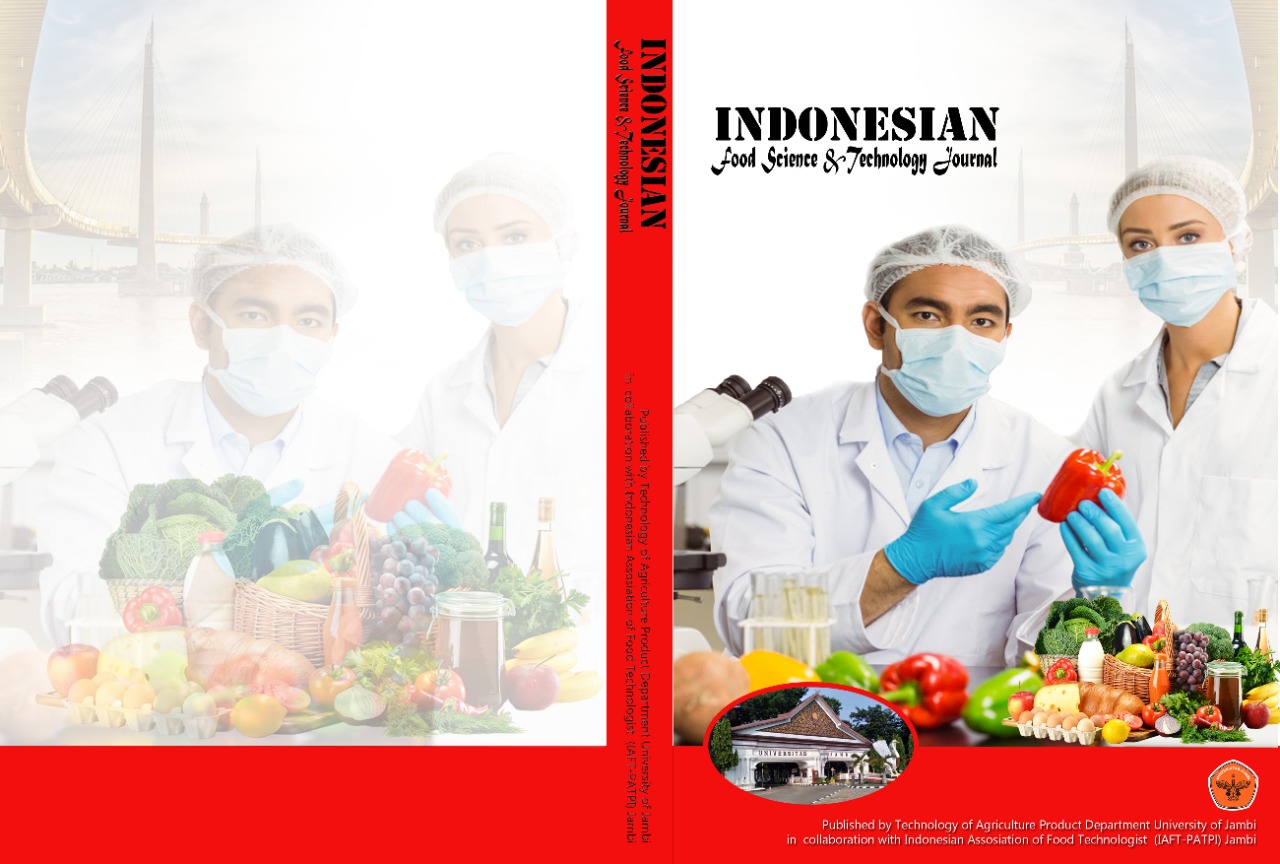Creative Food Product of Healthy Puffed Riceberry Snack Bar Developed by Private-Community-University Collaborations
DOI:
https://doi.org/10.22437/ifstj.v7i2.31095Keywords:
puffed rice, rice berry, snack bar, community product, creative foodAbstract
“Riceberry” a variety cultivated for its high anthocyanin content, offers bio-functional benefits. The development of Riceberry products not only enriches the nutritional profile but also adds a creative dimension to the One Tambon One Product (OTOP) initiative of Thailand. The collaborative effort of Hin Kling, a community enterprise in Nakhon Sawan, Chiang Mai Rajabhat University (CMRU), and the support from the Petroleum Authority of Thailand (PTT) Public Company Limited, has been instrumental in this venture. Adopting the Four Ps model (process, product, packaging, and product marketing), the collaboration focused on refining production processes, ensuring product quality, providing informative packaging, and devising effective marketing strategies. The study revealed that saturated fat content was reduced by two-fold through the innovative approach of blending palm oil with soybean oil for frying puffed rice. The resulting puffed rice was then combined with various ingredients and shaped into bars, offering a product with a commendable shelf life of up to three months. Moreover, a commitment to health was demonstrated by reducing the added palm sugar, leading to lower sugar content, reduced calories, and improved texture in the healthier product. Rigorous quality checks, including water activity value, anthocyanin content, and total and pathogenic bacteria count, ensured that the product met the standards set for cereal bars. To enhance consumer awareness, the product's nutritional value was highlighted through a detailed nutritional facts section on the food label. Additionally, a captivating community story was crafted to introduce the health-focused product to the wider health food market. The three-party collaboration behind the Riceberry initiative has successfully delivered a bio-functional, nutritious, and creatively presented product tailored for health-conscious consumers.
Downloads
References
Natsuda, K. Igusa, K., Wiboonpongse, A. and Thoburn, J. (2012). One Village One Product – rural development strategy in Asia: the case of OTOP in Thailand. Canadian Journal of Development Studies, 33:3, 369-385. DOI: 10.1080/02255189.2012.715082
Prawet Wasi. (2020). Triangular theory of pushing mountains. (in Thai) Retrieved from https://www.slideshare.net/imageplus/ss-71942765
Boonnarakorn, S., Deebhijarn, S., Saengmanee, W. (2023). A causal relationship model of factors influencing One Tambon One Product (OTOP) snack food product quality in Thailand. Journal of Asian Finance, Economics and Business. 9(8): 123-134.
Suindramedhi, S. (2015). Challenges for Thai OTOP community enterprises: experiences from Thailand and Japan, a comparative study. Journal of Contemporary Social Sciences and Humanities. 2(2): 39-47.
Thai Community Product Standards. (2023). Retrieved from https://tcps.tisi.go.th/public/StandardList.aspx
Thai Food and Drug Administration. (2023). GMP. Retrieved from https://en.fda.moph.go.th/our-services-new/good-manufacturing-practice-gmp/
Yasyi, D. (2022). Rice production by Southeast Asia countries and the challenges. Retrieved from
https://seasia.co/2022/11/06/rice-production-by-southeast-asia-countries-and-the-challenges
Setapramote, N., Laokuldilok, T. Boonyawan, D., and Utama-ang. (20218). Physicochemical, antioxidant
activities, and anthocyanin of Ricecberry rice from different locations in Thailand. Food and Apploed Bioscience Journal. 6(special issue),84-94.
Luang-In, V., Yotchaisam, M., Somboonwatthanakul, I., and Deeseenthum, S. (2018). Bioactivities of organic Riceberry rice and crude Riceberry rice oil. Thai Journal of Pharmaceutical Sciences. 42(3): 161-168.
Konnam, J., Teamkao, P., and Aninbon, C. (2022). Chemical composition and bioactive compounds of Riceberry rice produced under organic and conventional practices. The Journal of Agricultural Science. 161(1): 13-21.
Mungkung, R., Dangsiri, S., Satmalee, P., Surojanametakul, V. Saejew, K., and Chewala, S. H. (2023). The nutrition-environment nexus assessment of Thai Riceberry product for supporting environmental product declaration. Environment Development and Sustainability. https://doi.org/10.1007/s10668-022-02892-5
Anuyahong, T., Chusak, C., Thailavech, T., and Adisakwattana, S. (2020). Postprandial effect of yogurt enriched with anthocyanins from Riceberry rice on glycemic response and antioxidant capacity in healthy adults. Nutrients. 12, 2930;
doi:10.3390/nu12102930
Tongkaew, P., Purong, D., Ngoh, S., Phongnarisorn, B., and Aydin, E. (2021). Acute effect of Riceberry waffle intake on postprandial glycemic response in healthy subjects. Foods. 10, 2937. https://doi.org/ 10.3390/foods10122937
Falcrum. (2022). How to fill in lean canvas template: the guide to shape your start up idea into product. Retrieved fromhttps://fulcrum.rocks/blog/fill-in-lean-canvas
Yildiz, G., Wehling, R. L. and Cuppett, S. L. (2003). Comparison of four analytical methods for the determination of peroxide value in oxidized soybean oils. Journal American Oil Chemists’ Society. 80, 103–107.
Yamuangmorn S., Dell B., Prom-u-thai C. (2018). Effects of cooking on anthocyanin concentration and bioactive antioxidant capacity in glutinous and non-glutinous purple rice. Rice Science. 25:270–278.
Said, D., Belinato, G., Otero, R. L., Canale, L. C. F., Sarmienlo, G. S., Gaston, A., and Totten, G. E. (2016). Effect of the oxidation stability of soybean oil and palm oil on steel quenching performance. Proceeding of the 26th ASM Heat Treating Society Conference. B.L. Ferguson, R. Jones, D.S. MacKenzie, and D. Weires, editors. 258-265.
Nadeeshani, R., Wijayaratna, U. N., Prasadani, W. C., Ekanayake, S., Seneviratne, K. N., and Jayathilaka, N. (2015). Comparison of basic nutritional characteristics of the first extract and second extract of coconut milk. International Journal of Innovative Research in science, Engineering, and Technology. 4(10): 9516-9521.
Perna, M., and Hewlings, S. (2023). Saturated fatty acid chain length and risk of cardiovascular disease: A systematic review. Nutrients, 15, 30 https://doi.org/10.3390/nu15010030
Huang, Y., Chen, Z., Chen, B., Li, J., Yuan, X.,Li, J. Wang, W., Dai, T., Chen, H., Wang, Y., Wang, R., Wang, P. Guo, J., Dong, Q., Liu, C., Wei, Q., Cao, D., and Liu, L. (2022). Dietary sugar, consumption and health: umbrella review. Research. http://dx.doi.org/10.1136/
bmj-2022-071609
Sharma, C., Kuar, A., Aggarwal, P., and Singh, B. (2014). Cereal bar-a healthful choice a review. Carpathian Journal of Food Science and Technology. 6(2): 29-36.
Muangchan, N., Khiewvan, B., Chatree, S., Pongwattanapakin, K., Kunlaket, N., Dokmai,T. and Chaikamin, R. (2022). Riceberry rice (Oryza sativa L,) slows gastric emptying and improves the postprandial glycemic response. British Journal Nutrition. 128, 424-432.
K. Sarika, K., Jayathilakan, K., Lekshmi, R. G. K., Priya, E. R., Greeshma, S. S and Rajkumar, A. (2019). Omega-3 enriched granola bar: formulation and evaluation under different Storage Conditions. Fishery Technology. 56: 130 – 139.
Vu, T. P., He, L., McClements, D. J., and Decker, E. A. (2020). Effects of water activity, sugars, and proteins on lipid oxidative stability of low moisture model crackers. Food Research International. 130: https://doi.org/10.1016/j.foodres.2019.108844
Rawat, N. and Darappa, I. (2015). Effect of ingredients on rheological, nutritional and quality characteristics of fibre and protein enriched baked energy bars. Journal of Food Science and Technology. 52(5):3006–3013.
DOI 10.1007/s13197-014-1367-x
Gumus, C. E. and Decker, E. A. (2021). Oxidation in low moisture foods as a function of surface lipids and fat content. Foods. 2021, 10, 860.https://doi.org/10.3390/foods10040860
Enaru, B., Dret,canu, G., Pop, T.D., Stanil A., and Diaconeasa, Z. (2021). Anthocyanins: factors affecting their stability and degradation. Antioxidants 10, 1967. https:// doi.org/10.3390/antiox10121967
Ojha, P., Adhikari, A., Manandhar, U., Maharjan, S., and Maharjan, S. (2022). Utilization of buckwheat, proso millet, and amaranth for a gluten-free cereal bar. Indonesian Food Science and Technology Journal. 5(2): 57-62.
Kumar, P., Gupta, A., Mahato, D. K., Pandhi, S., Pandey, A. K., Kargwal, R., Mishra, S., Suhag, R., Sharma, N., Saurabh, V., Paul , V., Kumar, M., Selvakumar, R., Gamlath, S., Kamle, M., Enshasy, M. A. E., Mokhtar, J. A, and Harakeh, S. (2022). Aflatoxins in cereals and cereal-based products: occurrence, toxicity, impact on human health, and their detoxification and management strategies. Toxins 14, 687. https://doi.org/10.3390/ toxins14100687
VanZandt, V. (2023). What is a lean canvas? Definition, methodology, examples, and use guide. Retrieved from
https://ideascale.com/blog/lean-canvas-definition/
Byer, J. (2023). Unique value proposition: What it is, Why it is important, How to create a UVP, and 10 examples? Retrieved from https://www.crowdspring.com/blog/unique-value-proposition/
Downloads
Published
How to Cite
Issue
Section
License
Copyright (c) 2024 Indonesian Food Science and Technology Journal

This work is licensed under a Creative Commons Attribution 4.0 International License.







